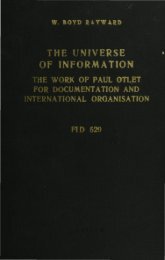User-Centered Evaluation of Information Retrieval - ideals
User-Centered Evaluation of Information Retrieval - ideals
User-Centered Evaluation of Information Retrieval - ideals
Create successful ePaper yourself
Turn your PDF publications into a flip-book with our unique Google optimized e-Paper software.
<strong>User</strong>-<strong>Centered</strong> <strong>Evaluation</strong> <strong>of</strong> <strong>Information</strong> <strong>Retrieval</strong> 99<br />
in" for reference librarians, and if so, is it reasonable to use the same<br />
criteria in evaluating an information system as in evaluating reference<br />
personnel?<br />
Definitive answers to these questions do not yet exist, nor will one<br />
set <strong>of</strong> answers apply to all systems, to all libraries, and to all users,<br />
users and their needs much closer to the<br />
all <strong>of</strong> the time. By placing<br />
center <strong>of</strong> evaluation, methodologies can be employed that are sensitive<br />
to situations and contexts <strong>of</strong> users. "Qualitative<br />
evaluation tells us how<br />
well we have met the patron's needs" (Westbrook, 1990, p. 73).<br />
Exactly how one should begin to both answer and ask these<br />
questions suggests a methodological discussion. Increasingly, researchers<br />
in user studies call for applying qualitative methods that is, in-depth<br />
investigations <strong>of</strong>ten using case study, which seek to study the behavior<br />
<strong>of</strong> individuals in all <strong>of</strong> the complexity <strong>of</strong> their real-life situations.<br />
Qualitative evaluation seeks to improve systems and services through<br />
a cyclical process, in which both quantitative (statistical) and qualitative<br />
methods are employed, each used to check and illuminate the other.<br />
Some methods such as observation and interviews are particularly wellsuited<br />
to field studies to which librarians can contribute substantially.<br />
Gathering the data in qualitative studies is done over time, <strong>of</strong>ten by<br />
participant observers who possess a knowledge <strong>of</strong> the setting and who<br />
could be expected to have insight into the situation. While simply "being<br />
on the scene" is hardly enough to qualify one as a researcher/evaluator,<br />
cooperative research and evaluation projects in which librarians play<br />
a significant role can do much to enhance one's understanding <strong>of</strong> the<br />
issues and problems associated with satisfying information needs. What<br />
follows is a discussion <strong>of</strong> some <strong>of</strong> the dimensions <strong>of</strong> the user's experience<br />
with an assessment <strong>of</strong> information retrieval.<br />
Although Bawden's work presents it, it is necessary to go one step<br />
further to question librarianship's assumptions about users and the<br />
purpose <strong>of</strong> information retrieval, and then to move to an in-depth<br />
exploration <strong>of</strong> what it means to seek information in libraries today.<br />
Until answers to such questions as "What are the user's expectations<br />
for how a system functions?," "What needs does it meet?," and "What<br />
is the experience <strong>of</strong> searching really like for the user?" are found, criteria<br />
for evaluating retrieval effectiveness will not be improved.<br />
CONCLUSION<br />
...the involvement <strong>of</strong> the practitioner is a sine qua non for the success <strong>of</strong><br />
user-oriented evaluation. (Bawden, 1990, p. 101)<br />
<strong>Information</strong> retrieval has been locked into a rationalistic, empirical<br />
framework which is no longer adequate. A different framework <strong>of</strong>
















